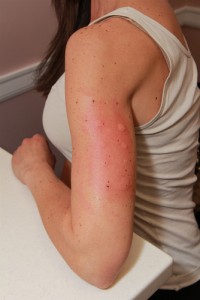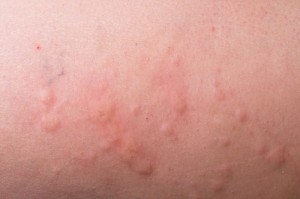Various Types of Hives May Be The Cause of Itchiness!
What Is Causing Your Hives? How To React To Hives
Are you staring in confusion at the bumps spreading across your skin? Is it hard not to scratch at these little bumps, be they pale or red? 20% of the population is stricken with hives at some point in their life, leaving many to question the cause of their unsightly rash. Hives, also known as Urticaria, cause swollen, painful, itchy break outs that include some type of red or white raised bumps on the tongue, lips and ears, or any other portion of the epidermis. Hives can result directly after contact with a known allergen, or they can appear for unknown reasons and seemingly out of the blue. Some patients report a stinging or burning sensation  with their hives, but most just report itching.
with their hives, but most just report itching.
Types Of Hives:
Angioedema:
These types of hives form beneath the skin, causing extremities to swell, including around the eyes and lips. Angioedema can last longer than regular epidermis hives; although with proper medical treatment the swelling should reduce within 24-hours.
Physical Urticaria:
These types of hives usually surface about one-hour post contact with a certain irritant. A direct irritant to the skin, such as extreme heat, sun exposure, frostbite, or vibration, can cause these hives to appear; rashes usually only persist at the contact site.
Dermatographism:
Rubbing, scratching, or even slapping at the skin causes this type of rash. Have you ever scratched so much a rash appeared? Then you have experienced dermatographism, which is caused from physical irritation such as excessively scratching at your skin. Often times, patients create a whole new form of hives (dermatographism) by simply scratching at their original set of hives.
Acute Urticaria:
These are popular types of hives, caused by certain food allergies, certain viral infections and internal diseases, medications you may be taking (including anti-inflammatory drugs), blood transfusions, or insect bites, among others. Acute urticaria hives should disappear within 6 weeks or less.
Common Food Allergies include:
- Peanuts
- Chocolate
- Shellfish
- Tomatoes
- Eggs
- Fresh Berries
- Milk
Chronic Urticaria:
Types of hives that last longer than 6 weeks are usually caused by an unknown source that has yet to be identified. If hives or angioedema continuously persist, further health complications can result, such as gastrointestinal, lung, and muscle disorders.
More Information about Different Types of Hives.
What Causes Different Types of Hives?
Our bodies are extremely sensitive to everything that we come into contact with; when our immune system overreacts to foreign objects various types of hives can result. Clearly, dog dander can’t actually do harm to us, but if your body is allergic to it, a common body response is to develop hives. More serious health conditions can also cause hives though, including vasculitis, or the inflammation of blood vessels, which usually persists for 24 hours plus and can leave behind painful bruising on the skin.
Since most types of hives are directly related to an allergy of some kind, it’s normal for some people to experience more sensitivities than others. One person might be sensitive to mold in an environment, while another person might not react to it at all. One who is allergic to mold might also be allergic to dust and pollen, typically these allergies are a hereditary trait. Another common allergy are pet allergies, since people love their pets it’s often an allergy that gets ignored, but just because you are willing to overlook it doesn’t mean your body is. Sometimes hive-inducing allergies are not so typical, but instead they can be related to our emotional wellbeing. High stress levels, for instance, can signal a reaction from your body that results in the formation of hives.
experience more sensitivities than others. One person might be sensitive to mold in an environment, while another person might not react to it at all. One who is allergic to mold might also be allergic to dust and pollen, typically these allergies are a hereditary trait. Another common allergy are pet allergies, since people love their pets it’s often an allergy that gets ignored, but just because you are willing to overlook it doesn’t mean your body is. Sometimes hive-inducing allergies are not so typical, but instead they can be related to our emotional wellbeing. High stress levels, for instance, can signal a reaction from your body that results in the formation of hives.
How To Treat Hives
- Isolate and then avoid the cause of your hives.
- Do not expose your skin to extreme heat; avoid the hot tub and hot showers too.
- Wear loose clothing so that your skin has a chance to breathe and does not become further irritated.
- You may need an antihistamine such as Benadryl, speak first with an Urgent Medical professional.
When To Visit A Doctor For Hives
Most of the time hives should vanish without medical attention, retreating as soon as the cause of the hives is taken away. In the instance that hives prohibit your ability to breathe, or if your mouth, tongue, or face becomes swollen you will want to see a doctor immediately. Also, a tightening of your throat, fainting, or wheezing is cause for immediate medical attention. These can all be signs of anaphylaxis, which can be fatal, and includes your entire body going into an allergic shock. Most dangerous is if the throat becomes swollen and prohibits your ability to breathe. If hives do not go away within a few days, contact South Florida Urgent Medical Center for a plan of action and relief you can count on.

